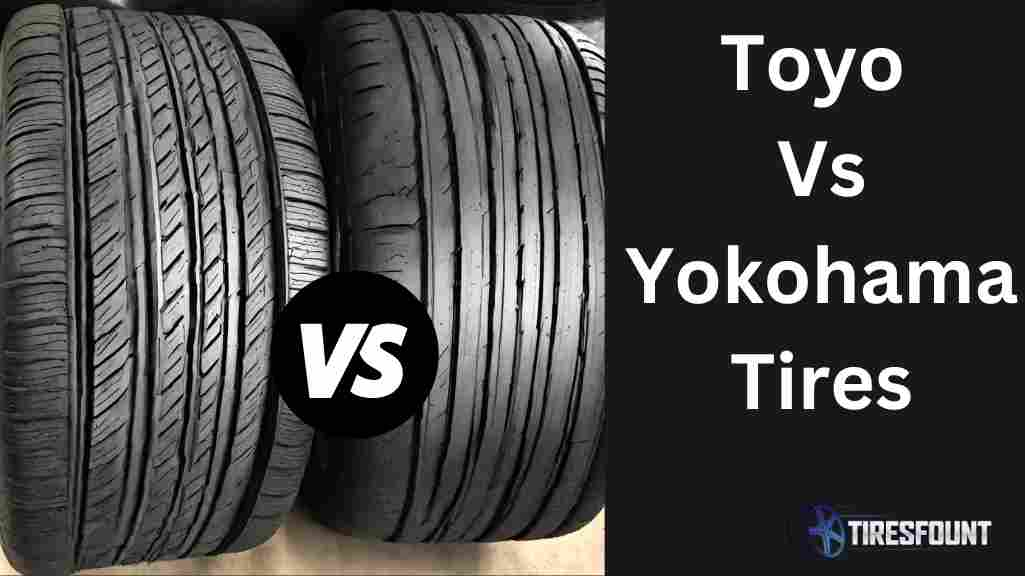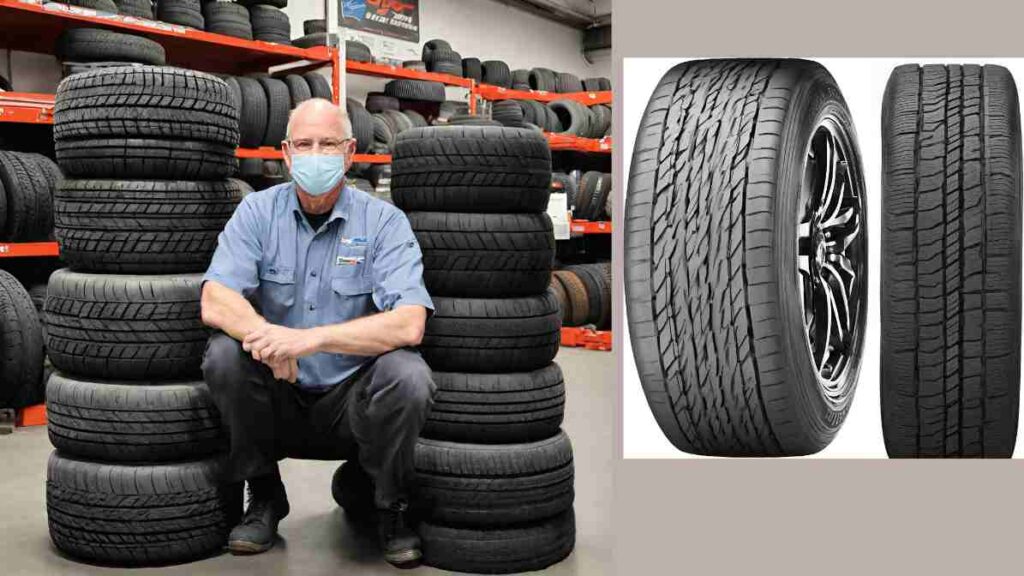Since 1945, Toyo has been making tires with a good reputation. They’re based in Itami, Japan, with14 sales companies worldwide.
And Yokohama Rubber Co., Ltd. began in 1917. They sold Japan’s first corded tire in 1921 from their Yokohama plant.
So what are the crucial differences between toyo vs yokohama tires? Toyo specializes in durable, all-terrain tires favored by off-road enthusiasts, while Yokohama excels in wet traction, particularly on rainy roads.
Toyo’s focus lies in technologies like Nano Balance for optimized grip and Silent Wall for reduced noise, whereas Yokohama integrates innovations such as Orange Oil Compound for enhanced grip and BluEarth for eco-friendliness.
Besides, Toyo tires generally come at a slightly higher price point compared to Yokohama, which offers more budget-friendly options.
In this article, I’ll provide a comprehensive comparison between Toyo and Yokohama tires.
Let’s start!

Comparison Table Between Toyo Vs Yokohama Tire
| Aspect | Toyo | Yokohama |
| Country of origin | Japan | Japan |
| Price | Generally priced slightly higher | Offers more budget-friendly options |
| Durability | Known for durability and -all-terrain capabilities | Emphasizes durability and longevity |
| Traction (Wet) | Performs well, but may vary | Often praised for exceptional wet traction |
| Traction (Dry) | Provides strong grip and responsive handling | Offers excellent traction and stability |
| Traction (Other) | Known for off-road capabilities | Offers winter-specific tires and diverse options |
| Environmental Impact | Committed to sustainability and eco-friendly practices | Focuses on reducing environmental footprint with initiatives like BluEarth |
| Technology | Utilizes advanced technologies for performance and durability | Incorporates innovative features for traction and fuel efficiency |
| Comfort/Noise | Offers a smooth and quiet ride | Known for providing a comfortable and quiet driving experience |
| Mileage Warranty | Typically offers mileage warranties ranging from 40,000 to 75,000 miles | Provides warranties with similar mileage coverage |
Key Differences Between Toyo vs Yokohama Tires- Core Discussion
Let’s discuss in detail about these two brand tires with examples.

Performance-based on different conditions
When comparing Toyo and Yokohama tires’ performance across different conditions, both excel in dry conditions, providing excellent grip and handling.
Thanks to innovative tread designs, Yokohama stands out for superior wet traction. Yokohama tread design types includes:
- Symmetric Tread: Same design across the tire’s face.
- Asymmetric Tread: Varies across the tire’s face for stability and traction.
- Unidirectional Tread: Rotates in one direction for better acceleration and stopping.
Toyo also performs well in wet conditions. For snow and ice, Yokohama offers a broader range of winter tires. Toyo shines in off-road terrain with rugged construction.
Yokohama may be more street-oriented. Both prioritize comfort and noise reduction, with Toyo often delivering a smoother, quieter ride.
Ultimately, the choice depends on driving needs and specific tire models.
Compatibility
Toyo and Yokohama tires are compatible with many vehicles, including cars, trucks, SUVs, and specialty vehicles.
Both brands offer tire sizes and types to fit various vehicle makes and models, ensuring compatibility with most vehicles on the road today.
It doesn’t matter whether you drive a sedan, crossover, pickup truck, or performance car, you can probably find Toyo or Yokohama tires that meet the specifications of your vehicle.
Check Toyo Tires vs Others Tires
Toyo VS Kumho Tires – Which Should You Pick?
All-Terrain Capabilities
Toyo and Yokohama tires both offer all-terrain capabilities. But Toyo is often recognized for its particularly robust performance in off-road conditions. Toyo’s all-terrain tires are engineered with rugged construction and aggressive tread patterns designed to provide traction on diverse surfaces like dirt, gravel, mud, and rocks.
They excel in off-road adventures, offering enhanced durability and stability.
While Yokohama also provides some all-terrain options, Toyo’s tires are generally favored by off-road enthusiasts for their reliability and capability in challenging terrain.
Check Toyo Tires vs Others Tires
Toyo Vs Falken Tires – Who Wins The Quality Race?
Mileage warranty
Toyo and Yokohama offer mileage warranties on their tires, assuring customers regarding the expected tread life of their products.
The specific mileage warranties can vary depending on the tire model and type.
Usually, Toyo’s mileage warranties range from around 40,000 to 65,000 miles, depending on the tire’s intended use and design.
Yokohama’s mileage warranties also typically fall within a similar range, with some tires like Tornante® All Season offering warranties of up to 80,000 miles or more for certain models.
And Yokohama Tire Corporation’s warranty covers tires on light trucks, minivans, or similar vehicles if they originally came with passenger tires.
The replacement tire must match or exceed the size, ply rating, load range, load index, and speed rating of the original tire.
If not used as described, the warranty won’t apply…
Check Toyo Tires vs Others Tires
Toyo Vs Continental Tires – Which Is Worth Picking?
Noise
Both Toyo and Yokohama tires prioritize reducing noise levels to enhance driving comfort.
Toyo tires are often praised for providing a smooth and quiet ride, thanks to their advanced noise-reduction technologies and tread designs.
They are engineered to minimize road noise and vibrations, offering a pleasant driving experience for daily commuting and long-distance travel.
But Yokohama produces noise gradually with speed up.
However, Yokohama tires also feature noise-reducing technologies and tread patterns designed to dampen road noise and promote a quieter ride.
Technology Used
Toyo employs Nano Balance Technology for optimized grip, Silent Wall Technology for reduced noise, and Multi-Wave Sipes for enhanced wet traction.
Meanwhile, Yokohama incorporates Orange Oil Compound, also known as Super Nano-Power Rubber Compound (SNPR), for grip and fuel efficiency.
They also use advanced tread designs like Variable Angled Groove Walls (VAW) and eco-friendly BluEarth Technology.
Each brand prioritizes different aspects of performance and innovation to cater to diverse driver needs and preferences.
Materials Used
Toyo and Yokohama utilize various high-quality materials in their tire construction to enhance durability.
Toyo tires often incorporate advanced rubber compounds formulated for durability and resistance to wear and tear.
They utilize sturdy sidewalls and carcass materials to withstand road hazards and maintain structural integrity.
Toyo’s tires may also feature reinforced belts and other components to enhance durability and longevity.
Yokohama tires are also engineered with durable rubber compounds, recyclable raw materials, silica, etc. designed to resist wear and abrasion, ensuring long-lasting performance.
They utilize high-strength sidewalls and carcass materials to provide stability and durability under various driving conditions.
Yokohama may incorporate additional materials such as steel belts and nylon reinforcements to reinforce tire strength and durability.
Environmental Impact
Toyo and Yokohama both focus on environmental sustainability –
- Toyo uses eco-friendly materials and processes, reduces rolling resistance for fuel efficiency, and practices recycling and reducing waste generation.
- Yokohama incorporates sustainable materials like orange oil, prioritizes energy efficiency, and engages in community initiatives for conservation.
Price
Toyo and Yokohama offer tires across a wide price range, with factors like tire type, size, and model influencing the cost.
Generally, Toyo tires tend to be priced slightly higher than Yokohama tires due to their reputation for durability and all-terrain capabilities.
Toyo tires start at $77.24 for all-season and go up to $1181.61 for off-road truck tires. Yokohama tires vary based on model, size, and store, generally costing between $70 and $300.
Yokohama often provides more budget-friendly options without compromising on quality, making them appealing to cost-conscious consumers.
Besides, promotions, discounts, and sales events may impact pricing for both brands.
Final Recommendations
For drivers seeking rugged performance and durability, Toyo tires are an excellent choice, particularly if you frequently venture off-road.
On the other hand, if you prioritize wet traction and eco-friendliness, Yokohama tires are a solid option.
With innovations Yokohama delivers excellent grip on wet roads while minimizing environmental impact.
Consider your driving needs and preferences carefully to select the tires that best suit your vehicle and lifestyle.
Must check our Brand Comparision
